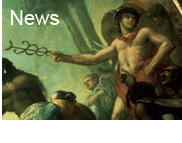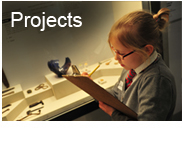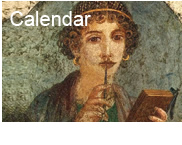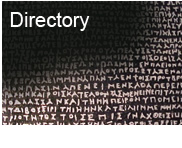Supporters
We have many supporters, including some you may recognise. We thought you might like to know why they think Classics should be part of our state education system and why they think it is still relevant today.
 ‘An understanding of the Classics, and of the civilisations of the distant past, equips the 21st century young man and woman with something unique. With a deep, rounded and enlightened understanding of the interplay of East and West, and the multi-ethnic roots of what we call modern civilisation. Apart from the sheer joy that the intimate study of Latin and Greek brings – it also carries with it a truly invigorating internationalist value. By allowing the next generation access to this wealth, let’s hope we are remembered as an age that chose to open rather than to close minds.’
‘An understanding of the Classics, and of the civilisations of the distant past, equips the 21st century young man and woman with something unique. With a deep, rounded and enlightened understanding of the interplay of East and West, and the multi-ethnic roots of what we call modern civilisation. Apart from the sheer joy that the intimate study of Latin and Greek brings – it also carries with it a truly invigorating internationalist value. By allowing the next generation access to this wealth, let’s hope we are remembered as an age that chose to open rather than to close minds.’
 ‘People often ask what the use of Classics is. Since nothing is more useful than pleasure, there’s your answer – the sheer unadulterated pleasure that the extraordinary language, literature, history and culture of the Ancient Greek and Roman worlds generates. You feel as if you are standing on the shoulders of giants.’
‘People often ask what the use of Classics is. Since nothing is more useful than pleasure, there’s your answer – the sheer unadulterated pleasure that the extraordinary language, literature, history and culture of the Ancient Greek and Roman worlds generates. You feel as if you are standing on the shoulders of giants.’
 ‘I am a great fan of Latin. I love it. I did it at school at both O-level and A-level, and I am a great supporter of Classics for All because apart from anything else Latin is the basis of our language and it gives you the basis of all the other Latin languages – French and Italian and Spanish. It helps you understand them and it carries knowledge with it, like a suitcase. It’s beautiful. It’s brilliant.’ Joanna Lumley is also a Patron of Classics for All and her recent broadcasts include the ITV series, Joanna Lumley’s Greek Odyssey.
‘I am a great fan of Latin. I love it. I did it at school at both O-level and A-level, and I am a great supporter of Classics for All because apart from anything else Latin is the basis of our language and it gives you the basis of all the other Latin languages – French and Italian and Spanish. It helps you understand them and it carries knowledge with it, like a suitcase. It’s beautiful. It’s brilliant.’ Joanna Lumley is also a Patron of Classics for All and her recent broadcasts include the ITV series, Joanna Lumley’s Greek Odyssey.
 ‘I know it seems odd to advocate teaching Latin when some of the country’s schools are currently accused of failing to teach English. But I still think that an elementary grounding in the Classics makes all languages easier to learn, and in the end it helps pupils with a huge range of other subjects. And best of all it opens up an extraordinary, rich and potent ancient world that has had a huge effect on the way we live now.’
‘I know it seems odd to advocate teaching Latin when some of the country’s schools are currently accused of failing to teach English. But I still think that an elementary grounding in the Classics makes all languages easier to learn, and in the end it helps pupils with a huge range of other subjects. And best of all it opens up an extraordinary, rich and potent ancient world that has had a huge effect on the way we live now.’
 ‘For me one of the most exciting things about studying Latin and Greek was learning about all the myths which still have such power in our lives today, from Troy to the Oedipus Complex.
‘For me one of the most exciting things about studying Latin and Greek was learning about all the myths which still have such power in our lives today, from Troy to the Oedipus Complex.
I am also struck by how many of the ancient stories and figures from the classical world have parallels with modern politics. You just have to read Robert Harris’s book about Cicero to realise that spin is nothing new.’
 ‘I was forced to take up Latin at the age of 11; I was forced to take up Greek at the age of 12. Now I myself would not wish to compel any pupil to pursue a subject for which there seemed little reason and even less inclination. And yet, for me such bullying coercion was the most important and the most felicitous event in my whole education. The Classics have delighted me profoundly ever since those early secondary schools days: first as a schoolmaster, and later as an examiner and administrator of classical subjects. I would have lived my life no other way.’
‘I was forced to take up Latin at the age of 11; I was forced to take up Greek at the age of 12. Now I myself would not wish to compel any pupil to pursue a subject for which there seemed little reason and even less inclination. And yet, for me such bullying coercion was the most important and the most felicitous event in my whole education. The Classics have delighted me profoundly ever since those early secondary schools days: first as a schoolmaster, and later as an examiner and administrator of classical subjects. I would have lived my life no other way.’
‘I cannot imagine how impoverished my life would have been had I not been given the opportunity by my first school to study the languages and civilisations of the ancient world. As a parent with two children at primary school, it saddens me deeply that they, and countless others, are being denied that chance that I had.’
 ‘Aside from basic literacy and numeracy, of all the subjects taught to me at school to what was then O-level, only two have been of unquestionable value to me every single day of my working life. One is the study of statistics and probability: a basic understanding of which is essential to making any decision. The other is the study of Latin (and Greek) which leaves its students with an increasingly rare skill – and hence a competitive advantage: the ability to express even complicated thoughts in the confident belief that what you have written is both clear in its meaning and correct in its grammatical construction.’
‘Aside from basic literacy and numeracy, of all the subjects taught to me at school to what was then O-level, only two have been of unquestionable value to me every single day of my working life. One is the study of statistics and probability: a basic understanding of which is essential to making any decision. The other is the study of Latin (and Greek) which leaves its students with an increasingly rare skill – and hence a competitive advantage: the ability to express even complicated thoughts in the confident belief that what you have written is both clear in its meaning and correct in its grammatical construction.’
 ‘Classics no longer unlocks a world of privilege, but it does give us the keys to an intellectual playground of breathtaking beauty, wonder, and rigour; it gives us the tools to help us understand who we are. It is wrong that so many schoolchildren are denied that opportunity.’
‘Classics no longer unlocks a world of privilege, but it does give us the keys to an intellectual playground of breathtaking beauty, wonder, and rigour; it gives us the tools to help us understand who we are. It is wrong that so many schoolchildren are denied that opportunity.’
 ‘The Romans did matricide, incest, misogyny and regicide like no one else. I started to learn Latin at grammar school at the age of 12 and was totally entranced, devouring Catullus, Cicero, Virgil, Juvenal and Suetonius until I left university with a degree in the subject nine years later. I’ve always found it heart-breaking that later generations of working-class children didn’t get the opportunity I had; only 2,868 pupils are studying GCSE Latin at state schools this year. Seventy per cent of the 9,360 GCSE entries were in the private sector, which educates only seven per cent of the school population.’
‘The Romans did matricide, incest, misogyny and regicide like no one else. I started to learn Latin at grammar school at the age of 12 and was totally entranced, devouring Catullus, Cicero, Virgil, Juvenal and Suetonius until I left university with a degree in the subject nine years later. I’ve always found it heart-breaking that later generations of working-class children didn’t get the opportunity I had; only 2,868 pupils are studying GCSE Latin at state schools this year. Seventy per cent of the 9,360 GCSE entries were in the private sector, which educates only seven per cent of the school population.’
‘The Roman and Greek worlds fascinate children because they are both like and unlike our world. They are real and fantastical. We still use Roman roads and can see remains such as Hadrian’s Wall and the exquisite mosaics of Fishbourne Roman Palace. A magnificent Roman bronze helmet with face mask was discovered in September in a field in Cumbria. Roman law remains the basis for the systems of civil law in use in continental Europe, South America, and much of Asia and Africa. We may not (usually) wear togas or watch gladiatorial contests, but in our dreams and fantasies we can all be Theseus or Ariadne, Aeneas or Dido.’






